Views: 0
Perhaps. Apple Cider Vinegar May Help Moderate Hormones Through Reducing Blood Sugar Spikes after High Glycemic Food Intake.

The Essential Info
People have been using vinegar medicinally for thousands of years, and information which indicates that vinegar is therapeutic for a variety of bodily ailments is accumulating.
The available science suggests that ingesting a small amount of apple cider vinegar, or any type of vinegar for that matter, might potentially help to improve acne by:
- Reducing the negative effects that high-sugar foods have on the body
- Replenishing antioxidants
The vast majority of home remedies for acne show very little promise, but drinking apple cider vinegar does have a bit of science behind it.
Keep Your Expectations Realistic: Drinking vinegar is unlikely to provide dramatic relief from acne.
Is Caution Necessary? There is very little research on long-term, frequent consumption of vinegar, but it is possible that it could cause health problems. So, as with most things in life, don’t overdo it. Keep your dosage to 2 tablespoons of vinegar (mixed with a cup or so of water), and do it no more than once per day.
How I Do It: I keep some organic apple cider vinegar in my fridge. It’s pretty cheap and widely available. After I eat a high-glycemic meal or dessert, I will sometimes mix a couple tablespoons of apple cider vinegar with water, take a deep breath, and down it. It’s got a strong and pungent taste, but it’s not terrible and it feels refreshing afterward. Even if it’s just placebo, it makes me feel a little better about not eating perfectly, plus I get a few bonus antioxidants.

The Science
- Jump down to How to Do It
- What Is Vinegar?
- How Might Drinking Vinegar Treat Acne?
- Dispelling the Myth of Vinegar As an “Alkalinizing Agent” for the Body
- Is Vinegar Safe to Drink?
There is some scientific evidence which suggests that ingesting vinegar might be somewhat helpful in managing acne due to its ability to reduce blood sugar levels and provide the body with antioxidants. It probably won’t work wonders, but it might help a tad.
First, let’s look at what vinegar is, and then we’ll consider how it might be useful in treating acne.
What Is Vinegar?
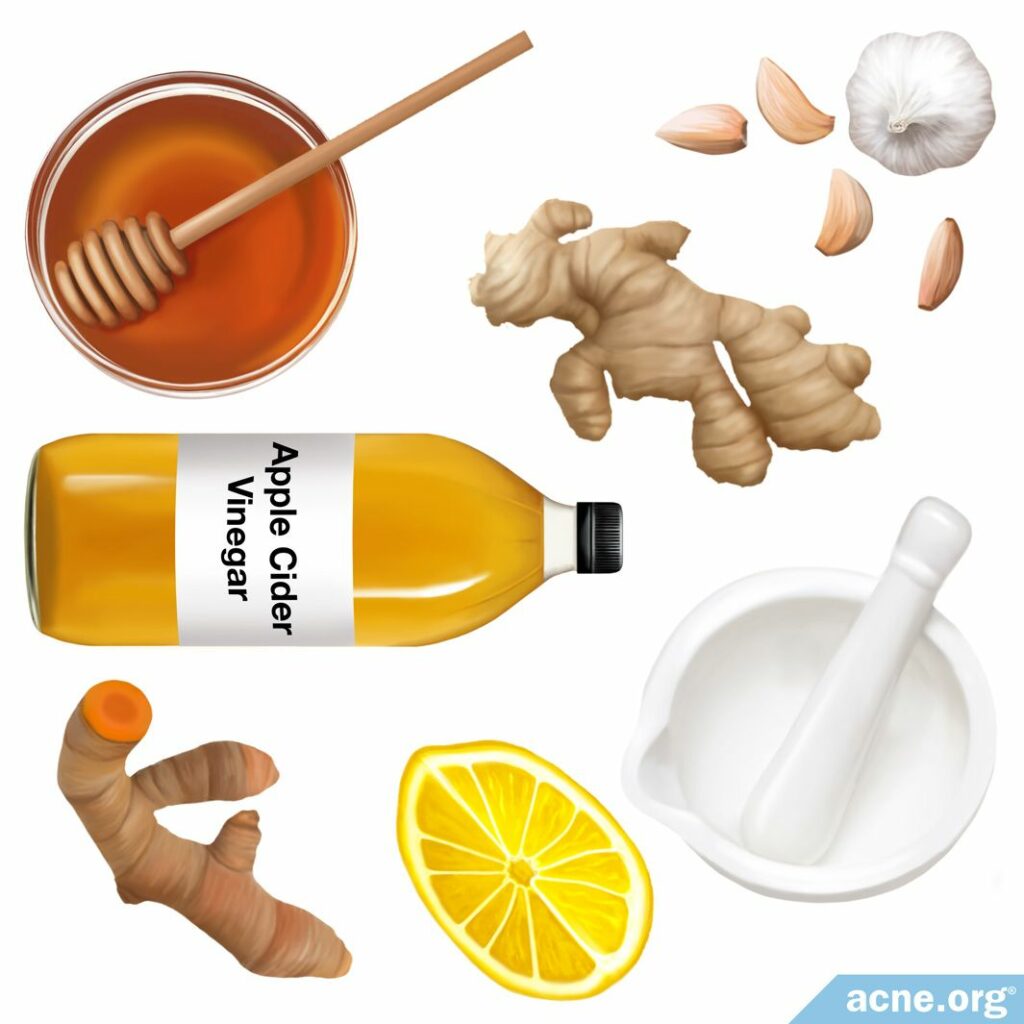
Vinegar is a natural food product that is made by a process called fermentation. Fermentation uses yeast and bacteria to convert sugar into alcohol and acids. Vinegar-fermentation is a two-step process:
- Yeast converts sugar from a carbohydrate-containing food, such as apples, grapes, and grains, into alcohol. Fermentation of different foods results in different kinds of vinegar.1,3,4
- A type of bacteria called Acetobacter turns the alcohol into acetic acid, which is the main component of vinegar.1-4
Vinegar is mostly water and acetic acid, but it contains a variety of other compounds in small amounts that give vinegar its characteristic flavor, including:
- Vitamins
- Mineral-salts
- Amino acids (molecules that form the basis of proteins)
- Various acids such as lactic, citric, and malic acids
- A group of compounds called flavonoids
It is the acetic acid and flavonoids that are most likely to contribute to the healing of acne.2,5,6
Anyone can make vinegar at home
Interestingly, while most vinegar is produced commercially, anyone can make vinegar at home. According to one chapter in the book series Advances in Applied Microbiology from 1976, “[n]early any unfortified wine or beer when exposed to the atmosphere will develop an acidity which, in many cases, results from the action of Acetobacter in converting the ethanol to acetic acid. Under normal household conditions, the conversion occurs quite slowly and there are no sharp lines of demarcation between the categories of wine, old wine, sour wine, and vinegar.”2
The history of vinegar as medicine
People have used vinegar medicinally for more than five thousand years for a variety of ailments, including the following:
- In 400 B.C., Hippocrates, a Greek doctor who is considered to be the father of modern medicine, prescribed a mixture of honey and apple cider vinegar in an attempt to cure diseases.3
- Since the late 18th century, doctors have used vinegar to help prevent and treat obesity.1
- During the American Civil War, in the 1860s, doctors used apple cider vinegar to disinfect soldiers’ wounds.3

More recently, according to a 2016 review article in the journal Current Opinion in Food Science, “Several studies have reported acetic acid is a bioactive compound that exhibits various therapeutic values. Up to date, vinegar has been reported not only for [reducing] obesity, but also shown to exhibit therapeutic effects on diabetes, cardiovascular disorders, and cancer.”1

For example, one study published in the Journal of Medicinal Food in 2017 tested the effects of drinking apple cider vinegar on obese rats. The researchers found that vinegar helped fight harmful substances called oxidants, also known as free radicals, and improved cardiovascular health in the rats. Of course, while these results are promising, this type of study needs to be repeated with human patients to make sure drinking apple cider vinegar has the same effect in humans as it does in rats.7
How Might Drinking Vinegar Treat Acne?
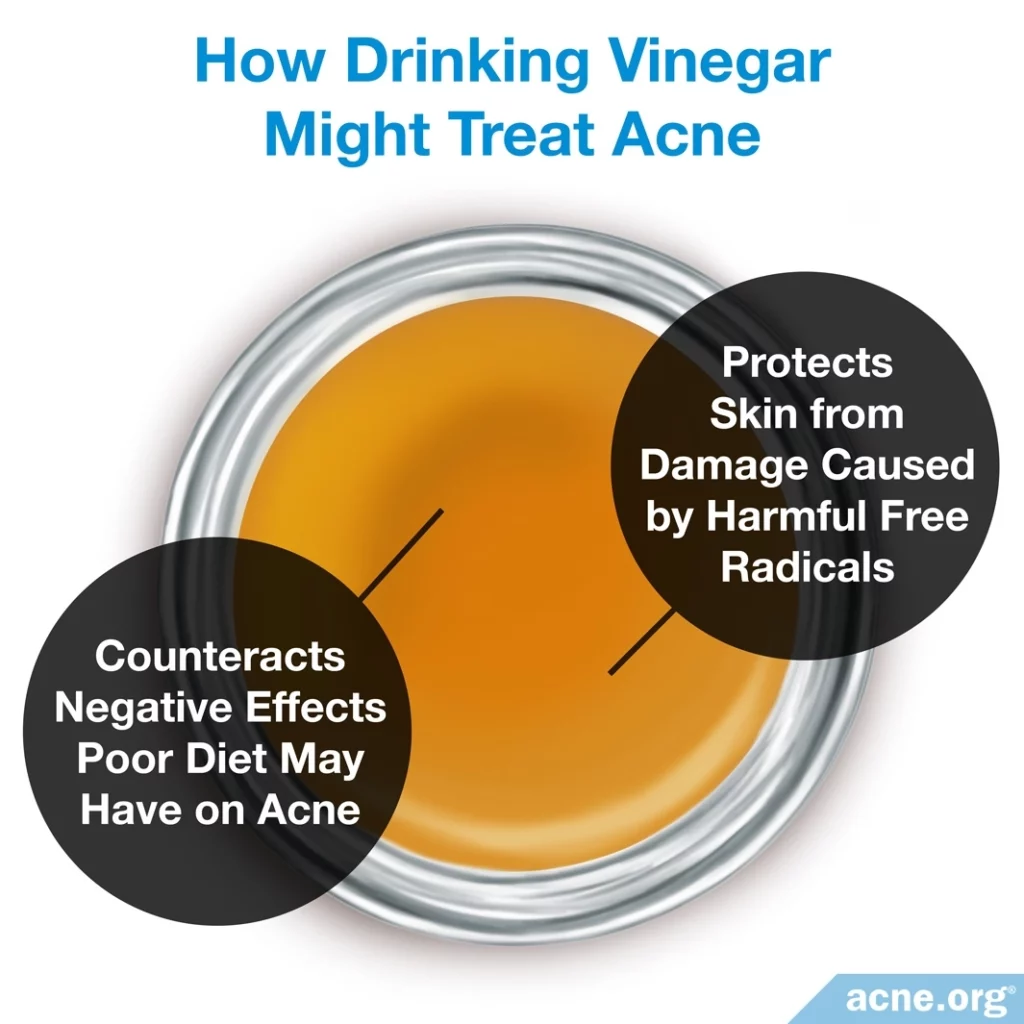
In recent years, evidence has been accumulating which suggests that diet may affect acne.8-11 When it comes to vinegar, it may:
- Counteract the negative effects that a poor diet may have on acne.
This is due to the acetic acid in vinegar.
- Protect the skin from damage caused by harmful molecules called free radicals, which may worsen acne.
This is due to the flavonoids in vinegar.
Let’s have a closer look at how vinegar may help, starting with how it may counteract the effects of a high-sugar diet, also called a high glycemic diet.
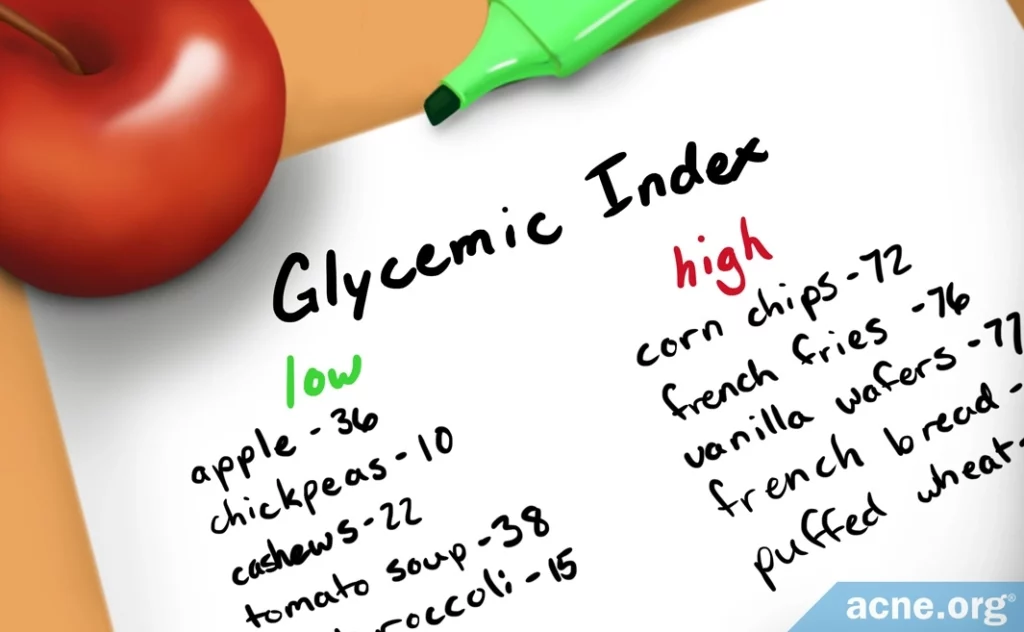
Counteracting a High-Sugar (High Glycemic) Diet
Research suggests that a high-sugar diet may promote acne. When we say “high-sugar,” we mean foods that contain a lot of sugar, but also high-carbohydrate processed foods. When we eat these types of food, our body produces insulin to process the sugar. The theory goes that a high-sugar diet causes the body to produce more insulin (an important hormone that regulates many other hormones in the body) and more androgens (male hormones that are present in both males and females), and high levels of these hormones leads to more acne.8,9
How vinegar may help: The acetic acid in vinegar may help reduce insulin spikes after eating high-sugar food.
Expand to read details of research
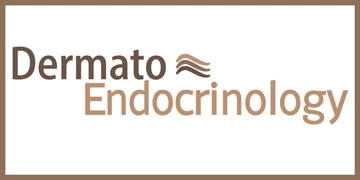
A series of clinical studies, reviewed in both a 2009 article in Dermato-Endocrinology and a 2009 article in the International Journal of Dermatology, indicated that a diet rich in sugar might influence acne by two different processes, both involving a hormone called insulin.8,9 One of the studies was a randomized controlled trial, which is a rigorous study that provides the most trustworthy evidence. Researchers examined whether a low-sugar diet reduced the number of acne lesions or not. They found that acne patients who consumed a diet low in sugar experienced:
- Greater reductions in acne lesions.
- An increase in insulin sensitivity, meaning that insulin functioned better.
- A decrease in the level of androgens (male hormones present in both males and females).8,9
Let’s have a closer at how blood sugar spikes and a corresponding rise in insulin might affect acne. It does this by:
- Stimulating skin oil cells (sebocytes) to increase in number. This results in the production of more skin oil (sebum). Higher levels of sebum are strongly associated with acne.
- Reducing the amount of a protein called sex hormone-binding globulin (SHBG), which binds to androgens and renders them inert. When insulin is high, this protein can’t carry out its function, which in turn allows androgen levels to rise. Higher levels of androgens are strongly associated with acne.8,9
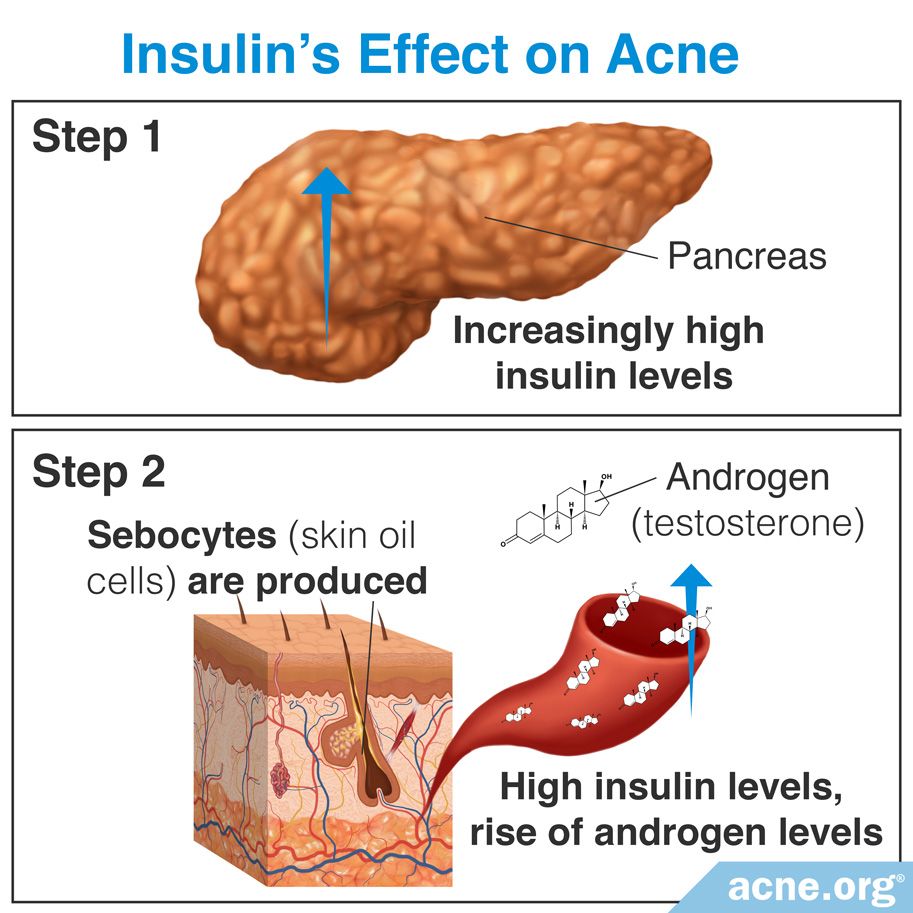
Several studies suggest that acetic acid, the main component of vinegar, may lower blood-sugar levels. For example, as reported by two studies, consuming several tablespoons of vinegar during a meal reduced blood-sugar after the meal by about one-quarter.10
Expand to read details of research

A 2010 article in Medscape General Medicine reviewed two studies which indicated that acetic acid, the main component of vinegar, lowered blood-sugar levels. One study demonstrated that 4 tablespoons of strawberry vinegar, consumed with a meal, reduced post-meal blood-sugar by more than 20%. The other study found that consuming 1-½ tablespoons of white vinegar as salad dressing and a piece of white bread reduced it by more than 30%.10
Adding even more compelling evidence to the argument that drinking vinegar could indeed lower blood sugar after a high-carbohydrate meal, a team of Brazilian and American scientists reviewed all the research published on this topic between 1995 and 2018 and came to a similar conclusion. The evidence confirmed that consuming 2-6 tablespoons of vinegar significantly reduces post-meal blood sugar.11
However, the researchers noted that while vinegar works this way in the short term, we need more studies looking at the effects of consuming vinegar every day over the long term.11 The longest-running studies we have so far looked at people who consumed apple cider vinegar for more than 8 weeks. These studies found that drinking vinegar daily over a couple of months did lower blood sugar levels.12 However, we still need more research that tracks participants over many months or even years to see whether consuming vinegar over the long term continues to be beneficial.
Expand to read details of studies

The large joint Brazilian and American study was published in 2019 in the journal Clinical Nutrition ESPEN. The researchers looked through all the articles published on the topic of vinegar and blood sugar between 1995 and 2018. They found significant evidence that consuming 10-30 mL, or about 2-6 tablespoons, of vinegar reduced blood sugar after a meal rich in carbohydrates.11
The researchers cautioned that we do not know the long-term effects of drinking vinegar daily. They wrote, “consumption of 10-30 mL (~2-6 tablespoons) of vinegar as a dressing or diluted in beverages appears to be adequate to acutely alter glycemic profile. In contrast, this dose can be infeasible if used habitually.”11

More recently, another team of researchers analyzed 9 studies on the effects of longer-term consumption of vinegar. They published their findings in the journal BMC Complementary Medicine and Therapies in 2021. The researchers concluded that consuming apple cider vinegar for more than 8 weeks significantly reduces so-called fasting blood sugar levels, meaning blood sugar levels in a person who hasn’t eaten in several hours.12 However, 8 weeks is still a relatively short time, so more research on vinegar consumption over many months or years is needed to see whether the positive effects hold and whether any side effects emerge after long-term use.
While scientists still do not know exactly how acetic acid lowers blood-sugar, they believe it inhibits digestive enzymes (molecules that speed up chemical reactions), which break food down into sugars. By inhibiting these enzymes, acetic acid reduces the production of sugars.10
Counteracting a Diet High in “Bad” Fat
When we eat fats, these fats make their way into the bloodstream. For the purpose of understanding, let’s take a broad brush and simply consider that saturated fats in the blood are bad for acne and unsaturated fats in the blood are good for acne.
One study suggests that it is possible that vinegar might reduce the amount of “bad” saturated fats in the bloodstream. In the study, people who consumed apple cider vinegar over 8 weeks experienced a reduction in harmful fatty substances in their blood.13
Expand to read details of study

A 2012 study in Life Science Journal evaluated whether consuming apple cider vinegar affected the levels and types of fatty acids in the blood or not. They looked at a sample of people who contained high levels of fatty acids in their blood and had never taken medications in order to lower these levels. The researchers concluded, “The results of the present study indicated that 8 weeks of apple cider vinegar consumption significantly reduced harmful lipids, i.e. total cholesterol, LDL, and triglyceride.”13 While cholesterol, LDL, and triglycerides are not fatty acids, they are fatty substances that are made up mostly of fatty acids, so it is reasonable to assume that vinegar has this effect on fatty acids as well.
Replenishing Antioxidants
Vinegar contains several antioxidants, including a type of antioxidant called flavonoids. Antioxidants are molecules that prevent cell damage from molecules called free radicals. This is relevant to acne because the damage caused by free radicals on the skin can result in inflammation and breakouts.
The antioxidant properties of vinegar might also help with acne by lowering cholesterol. This is important because cholesterol contributes to the depletion of antioxidants. The idea that vinegar contains antioxidants that may counteract cholesterol and thus potentially help with acne is backed up by a 2012 scientific article.13
Expand to read quote from article

According to a 2012 article in Life Science Journal, “Apple cider vinegar contains [compounds] that have beneficial health effects. Its antioxidant flavonoid content can reduce the harmful effects of high cholesterol diets.”13
Dispelling the Myth of Vinegar As an “Alkalinizing Agent” for the Body
Some people believe that consuming apple cider vinegar makes the body more alkaline (less acidic). This assertion is of no scientific merit. The body’s built-in balance of acidity and alkalinity takes care of this. The body is slightly alkaline, and the skin is slightly acidic. This balance is important enough so as to prioritize maintaining it over everything else, so in most cases, nothing can disrupt it.14
Is Vinegar Safe to Drink?
People have been consuming vinegar for thousands of years, and it is considered to be relatively safe. However, there are reports of rare, harmful effects on the gastrointestinal system. Since vinegar is acidic, drinking too much of it can result in inflammation of the esophagus (food pipe), which can lead to more serious complications over time. Vinegar also can cause wheezing and inflammation of the lungs if it enters them.
While side effects from consuming vinegar are relatively rare, a 2006 medical article points out that as more people turn to vinegar as a home remedy, more research into potential side effects is needed as well.10
Expand to read quote from article

Side effects from consuming vinegar are rare, but as a 2006 article in Medscape General Medicine explains, “These complications attributed to vinegar are isolated occurrences, but with the increased interest in vinegar as adjunct therapy […], carefully controlled trials to examine potential adverse effects of regular vinegar ingestion are warranted.”10
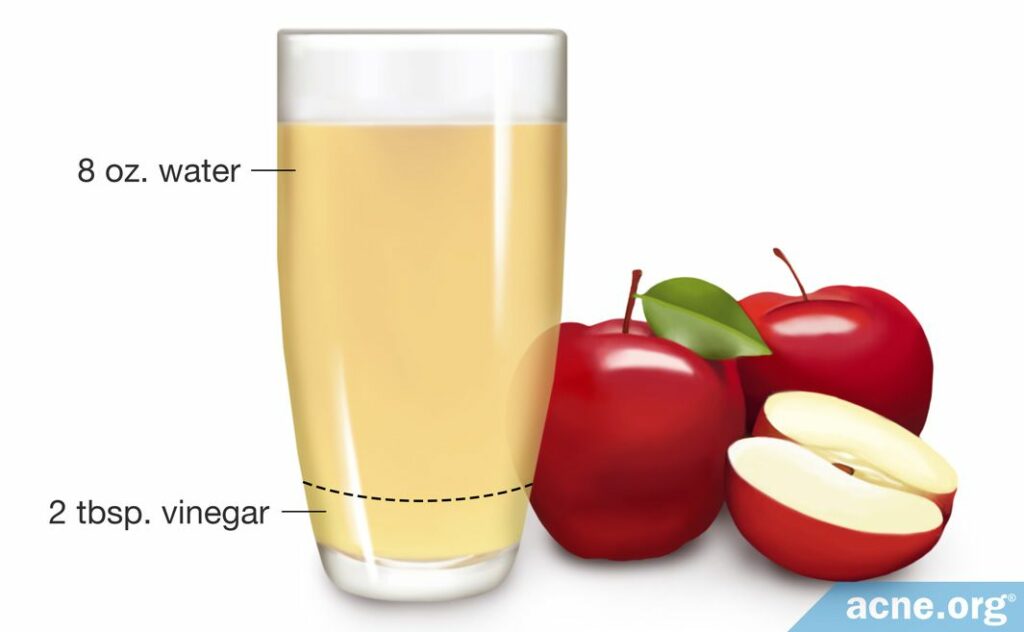
How to Do It:
If you would like to drink ACV as part of your diet, be sure to dilute it first. Use the following suggestions:
- Mix 1 – 2 tablespoons of ACV with 8 oz. of water. Decrease the amount of ACV if you experience any issues, such as irritation of the esophagus. Optional: For added sweetness, add a bit of stevia to the mixture.
- Drink it during or immediately after a meal to help reduce insulin spikes. Tip: Due to its acidity, some people choose to drink ACV with a straw to better protect the enamel on their teeth.
You can also incorporate ACV into your diet in other ways:
- Use it in salad dressing
- Add it to marinades
- Spray it onto popcorn
- Add it to your morning juice or smoothie
- Stir it into soups, stews, beans, or other recipes
A word of caution: While apple cider vinegar may have many beneficial effects on the body, too much of a good thing can cause problems. If you notice feeling worse after drinking ACV, use common sense and discontinue use. Also, be sure to ask your doctor about interactions between ACV and any medications you are taking prior to use.
References
- Samad, A., Azlan, A. & Ismail, A. Therapeutic effects of vinegar: A review. Curr. Opin. Food Sci. 8, 56 – 61 (2016). https://www.sciencedirect.com/science/article/abs/pii/S2214799316300479
- Conner, H.A., & Allgeier, R.J. Vinegar: Its history and development. In: Advances in Applied Microbiology. 20, 81-133. (1976) https://www.sciencedirect.com/science/article/pii/S0065216408701102
- Atik, D., Atik, C. & Karatepe, C. The Effect of External Apple Vinegar Application on Varicosity Symptoms, Pain, and Social Appearance Anxiety: A Randomized Controlled Trial. Evidence-based Complement. Altern. Med. 2016, 6473678 (2016). https://www.hindawi.com/journals/ecam/2016/6473678/
- Dabija, A. & Hatnean, C. A. Study concerning the quality of apple vinegar obtained through classical method. J. Agroaliment. Process. Technol. 20, 304 – 310 (2014). https://pdfs.semanticscholar.org/7090/6c7a543fc810cf99a157184197ff252607b5.pdf
- Setorki, M., Asgary, S., Eidi, A., Rohani, A. H. & Khazaei, M. Acute effects of vinegar intake on some biochemical risk factors of atherosclerosis in hypercholesterolemic rabbits. Lipids Health Dis. 9, 10 (2010). https://www.ncbi.nlm.nih.gov/pubmed/20109192
- Lila, M. A. Anthocyanins and Human Health : An In Vitro Investigative Approach. J. Biomed. Biotechnol. 5, 306 – 313 (2004). https://www.ncbi.nlm.nih.gov/pubmed/15577194
- Halima, B. H., Sonia, G., Sarra, K., Houda, B. J., Fethi, B. S. & Abdallah, A. Apple cider vinegar attenuates oxidative stress and reduces the risk of obesity in high-fat-fed male Wistar rats. J. Med. Food 21, 70-80 (2018). https://pubmed.ncbi.nlm.nih.gov/29091513/
- Pappas, A. The relationship of diet and acne: A review. Dermatoendocrinol. 1, 262 – 267 (2009). https://www.ncbi.nlm.nih.gov/pmc/articles/PMC2836431/
- Spencer, E. H., Ferdowsian, H. R. & Barnard, N. D. Diet and acne: A review of the evidence. Int. J. Dermatol. 48, 339 – 347 (2009). https://www.ncbi.nlm.nih.gov/pubmed/19335417
- Johnston, C. S. & Gaas, C. A. Vinegar: medicinal uses and antiglycemic effect. MedGenMed. 8, 61 (2006). https://www.ncbi.nlm.nih.gov/pmc/articles/PMC1785201/
- Santos, H. O., de Moraes, W. M. A. M., da Silva, G. A. R., Prestes, J. & Schoenfeld, B. J. Vinegar (acetic acid) intake on glucose metabolism: A narrative review. Clin. Nutr. ESPEN. 32, 1-7 (2019). https://www.ncbi.nlm.nih.gov/pubmed/31221273
- Hadi, A., Pourmasoumi, M., Najafgholizadeh, A., Clark, C. C. T. & Esmaillzadeh, A. The effect of apple cider vinegar on lipid profiles and glycemic parameters: a systematic review and meta-analysis of randomized clinical trials. BMC Complement. Med. Ther. 21, 79 (2021). https://pubmed.ncbi.nlm.nih.gov/34187442/
- Beheshti, Z. et al. Influence of apple cider vinegar on blood lipids. Life Sci. J. 9, 2431 – 2440 (2012). http://www.lifesciencesite.com/lsj/life0904/360_10755life0904_2431_2440.pdf
- Lee Hamm, L., Nakhoul, N. & Hering-Smith, K. S. Acid-base homeostasis. Clin. J. Am. Soc. Nephrol. 10, 2232 – 2242 (2015). https://www.ncbi.nlm.nih.gov/pubmed/26597304
The post Can Drinking Apple Cider Vinegar Help with Acne? appeared first on Acne.org.

